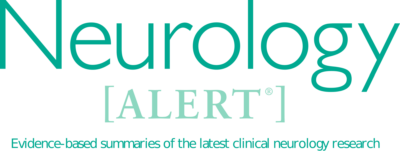
Neurology Alert – May 1, 2003
May 1, 2003
View Issues
-
A Novel Treatment for Parkinson’s Disease With Remarkable Results
A number of neurotrophic factors have great promise for the treatment of neurologic diseases. Prior work showed that a number of neurotrophic factors appeared to have promise for treating ALS, as well as peripheral neuropathy. -
Memantine for Advanced Alzheimer’s Disease
Currently, there are no medications specifically approved in the United States for treatment of the advanced stages of Alzheimers disease (AD). Results of the first US large-scale, prospective, double-blind study of memantine in the treatment of moderate-to-severe AD indicate that memantine-treated advanced AD patients fare better than those who received placebo, with no significant treatment-related side effects. -
Predictors of Disability in MS
Confavreux and colleagues studied 1844 multiple sclerosis (MS) patients enrolled in a large European database up until 1997. Clinical variables were identified early in the course of the disease, and their continued prognostic significance was determined after the first stages of irreversible neurological disability. -
A Negative Trial of Creatine in ALS
This is the first reported clinical trial of the effects of creatine in sporadic ALS patients. The trial was carried out in The Netherlands. -
Silent Strokes Predispose to Dementia
There is little doubt that cerebrovascular disease is a major contributor to cognitive decline in the elderly. Recurrent symptomatic strokes affecting cortical or subcortical function inevitably result in a stepwise burden of accumulating damage and disability. -
Perioperative Ulnar Neuropathy: Fact or Fiction?
Consider this all-too-familiar scenario. Patient X awakens from otherwise uneventful abdominal surgery and complains of ulnar nerve distribution weakness or tingling, or both. Ulnar neuropathy at the elbow (UNE) is documented, litigation ensues, and large sums of money exchange hands. Who is guilty and of what? -
NSAIDS: Not Associated With Cerebral Hemorrhage but not Protective vs Ischemic Stroke
Inhibition of thromboxane A2 synthesis by aspirin and nonsteroidal anti-inflammatory drugs (NSAIDs) underlies the risk of bleeding complications associated with their use. Aspirin use is associated with a reduced risk of thrombotic events and possibly an increased risk for intracerebral hemorrhage (ICH). -
Pharmacology Watch: Counterfeit Procrit Uncovered by FDA Surveillance
In one of the more bizarre stories of the year, the FDA has uncovered files of counterfeit Procrit (epoetin alfaJohnson & Johnson) in routine surveillance. To make matters worse, the fake vials have been contaminated with bacteria and many contain no active ingredient.
